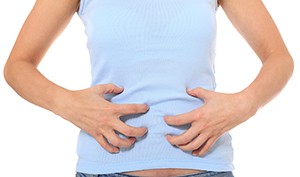Heartburn is not what you think

HCL is our body’s first line of defense against disease-causing
microbes that protect the body from pathogens and reduce the risk of infections.
by Paula Owens —
Hydrochloric acid (HCL) plays an important role in digestion. It is needed to activate enzymes that breakdown protein. HCL is also required for proper pH levels, bacterial balance, a healthy microbiome and the absorption of B12, folate and many other important nutrients. HCL is our body’s first line of defense against disease-causing microbes. It protects the body from pathogens and reduces risk of infections.
An HCL deficiency inhibits breakdown and digestion of the food we eat, thereby causing malnourishment and putrification of proteins. This results in numerous problems, including inflammation, candida, yeast, parasites and urinary tract infections, bacterial overgrowth, malabsorption, intestinal permeability and many other health problems.
Many people with hypochlorhydria (low stomach acid) or achlorhydria (no stomach acid) often complain of bloating, belching, heartburn, indigestion, a feeling of heaviness in the stomach after eating or feeling full after eating only a small amount of food. Then, there are those with little or no stomach acid who experience absolutely no symptoms at all.
Hypochlorhydria can be caused by poor food choices. The standard American diet (SAD) is high in sugar, processed carbs, wheat, gluten, corn, soy, omega-6 fats, trans fats, artificial sweeteners, GMOs and processed junk food.
Other causes include antibiotic overuse, drinking too much alcohol, NSAID use, H. pylori infection, hiatal hernia, oral contraceptives, antacids and proton-pump inhibitors (PPIs), gastric bypass surgery, and zinc and thiamine deficiencies.
Deficiencies are also affected by the normal aging process, stressful lifestyles, vegetarian diets, eating too much too quickly and drinking liquids during mealtime, which reduce the natural production of HCL.
The older we get, the probability of hypochlorhydria or achlorhydria becomes more common than not. HCL deficiency is very common after age 50 and, by age 65, many individuals are achlorhydric.
Advertising suggests that heartburn and indigestion are caused by too much stomach acid. This is seldom, if ever, the case. Actually it is just the opposite, not enough stomach acid. Unfortunately, many medical professionals fail to recognize how serious a health problem hypochlorhydria and achlorhydria are.
Over-the-counter antacids, PPIs and commonly prescribed drugs for heartburn are associated with gut infections; dysbiosis; C. difficile; deficiencies of vitamin B12, magnesium and calcium; osteoporosis; cognitive dysfunction; and an increased risk of pneumonia and heart attack.
PPIs and antacid use set the stage for later degenerative diseases by interfering with digestion and absorption of protein, vitamins and minerals. These drugs neutralize stomach acid, reduce or block stomach acid production and cause nutrient deficiencies, bacterial imbalances and disrupt microbial diversity. This increases risk for opportunistic infections, numerous vitamin deficiencies and bone fractures — exactly what you do not want.
Many commercial antacids contain toxic ingredients, such as aluminum, artificial colors and sweeteners. These chemicals disrupt digestion and alter the structure and function of the stomach lining cells, causing side effects like headache, diarrhea and abdominal pain.
Common symptoms of hypochlorhydria
Symptoms include indigestion, heartburn and acid reflux; gas, bloating or belching shortly after meals; intestinal permeability (leaky gut); undigested food in stool; and constipation and diarrhea.
Also included in the list are hair loss and dandruff; weak fingernails; bad breath; multiple food sensitivities; hives, acne and dry skin; loss of taste for meat and no appetite for breakfast; excessive fullness after meals; nausea after taking vitamins; a history of taking acid-blocking drugs; stressful lifestyles; and zinc, iron, thiamine, B12 and other nutrient deficiencies.
Conditions linked to hypochlorhydria include asthma, depression and anxiety, rosacea, hepatitis, adrenal and thyroid dysfunction, chronic headaches, autoimmune disease, rheumatoid arthritis, diabetes, osteoporosis, psoriasis, gallbladder disease, chronic hives, candida, intestinal parasites, small intestinal bacterial overgrowth, urinary tract infections and bacterial infections.
Natural remedies for hypochlorhydria
• Supplemental betaine HCL with pepsin — Hydrochloric acid supplementation is often fundamental to breaking this cycle of chronic digestive insufficiency.
Note: Avoid betaine HCL if you suspect you have an ulcer, gastritis or are taking PPIs. Instead use Gastrazyme, vitamin U (raw cabbage juice) and other nutrient components, such as L-glutamine powder, DGL licorice and slippery elm for taming the flame, digestion and healing the gut. NSAIDs and corticosteroids increase the chances of ulcers in the stomach and, together with betaine HCL, increase the risk of gastritis.
• Digestive enzymes and probiotics — Include these with your meals.
• Raw, unpasteurized apple cider vinegar — Take one to two teaspoons mixed with a small amount of water before meals.
• Mealtime — Chew food thoroughly and avoid drinking liquids with meals.
You can expect improved digestion and assimilation of protein, amino acids, minerals and other important nutrients with improved HCL status. As a bonus, your energy, strength, endurance, mood and sleep will also improve.
If sub-optimal levels of stomach acid are your problem, you can literally add years of better health to your life by addressing it. Proper digestion and absorption of food are fundamental requirements for optimal health.
Paula Owens, M.S., is a holistic nutritionist, Functional Health practitioner, and fitness and fat-loss expert with more than 25 years of experience. She is the author of The Power of 4 and Fat Loss Revolution. paulaowens.com.
Reprinted from AzNetNews, Volume 34, Number 5, October/November 2015.





November 14, 2015
Featured, Food, Nutrition and Diet, October/November 2015 Issue, was on front page